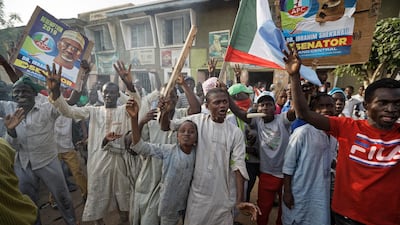Nigerian President Muhammadu Buhari looks on course to be re-elected for another four-year term after surging into a substantial lead in early election results the main opposition party has alleged were marred by irregularities.
Mr Buhari had gained 56 per cent of the total vote with results from 13 states and the Federal Capital Territory of Abuja announced by the Independent National Electoral Committee (INEC), Nigeria’s electoral umpire, by noon on Tuesday.
Atiku Abubakar, the candidate of the main opposition People’s Democratic Party (PDP), had amassed 41 per cent of the total votes counted thus far.
Nigeria’s presidential elections pit Mr Buhari against Mr Atiku, two Muslim septuagenarians from the country’s northern region, and 70-odd other candidates from small political parties.
A final tally is expected on Tuesday or Wednesday.
To be declared winner, a candidate must obtain the majority of the ballot and more than 25 per cent of the vote in at least 24 of Nigeria’s 36 states.
A runoff will hold if neither of the candidates gain the majority of the vote.
With official results yet to be declared in six of eight northern states that have voted for Mr Buhari in every election since 2003 and have the highest number of registered voters, his re-election looks all but certain, according to Stanley Azuakola, director at Civic Monitor, a civic group engaging Nigerians to vote in elections.
“The pattern is already holding,” Mr Azuakola said of the two states of Jigawa and Gombe that have already voted overwhelmingly for Mr Buhari in these elections.
The PDP, through its chairman Uche Secondus, rejected the results and accused the government of using “inducements, manipulation, and incarcerations” and enlisting the security forces “to silence the voices of our long-suffering people”.
Nigeria's federal government retorted through the Minister of Information and Culture, Lai Mohammed, who dismissed the claims and accused the opposition of "laying the groundwork for a constitutional crisis".
Nigerians went to the polls on Saturday after an initial week-long postponement caused by “logistical” issues that left many observers concerned over potential low voter turnout in the rescheduled elections.
The election was marked by a late start throughout the country with many voters like Shamsudeen Balogun, a fuel attendant in the Lagos suburb of Ikoyi, telling The National he spent more than an hour waiting for electoral officials to arrive with voting materials.
Many others across the country also complained of long wait times and glitches in the card readers.
The polls were also characterised by pockets of serious violence on Election Day that began with multiple bomb blasts in Borno and militant attacks in Yobe, both northeastern states that have been frequently targeted by terror group Boko Haram.
At least 47 people were killed in violent attacks across the country, according to Clement Nwankwo, director of Situation Room, a coalition of civic societies monitoring the polls. The monitor put the total death toll at more than 260 since the start of the election campaign in October.
In a statement Monday, Mr Nwankwo said the election was a step back from the 2015 polls and chided the electoral body for not managing the polls efficiently.
Whoever becomes Nigeria’s next president will be tasked with overcoming chronic economic woes that have left many unemployed and 91 million of its citizens living in extreme poverty.
Security concerns also remain top of the agenda with Boko Haram and the Islamic State’s West Africa Province, a splinter group of the extremist organisation, staging high-profile attacks in recent months.

